ERP Systems in the Cloud: Case Studies of Iconic, Woolworth, ALDI
VerifiedAdded on 2021/01/01
|13
|3976
|357
Report
AI Summary
This report provides a comprehensive overview of Enterprise Resource Planning (ERP) systems, focusing on the role of cloud computing in enhancing their flexibility and efficiency. It begins by defining ERP and its core functions, highlighting the benefits for businesses in managing resources and streamlining processes. The report then delves into the different types of ERP systems: on-premise, hosted, and cloud-based, comparing their advantages, disadvantages, and implementation considerations. Case studies of leading Australian business groups like Iconic, Woolworth, and ALDI are used to illustrate the practical applications of ERP systems. The report also discusses the security aspects and challenges associated with ERP systems, emphasizing the importance of robust security measures and adaptability to meet future growth objectives. Finally, the report analyzes the impact of cloud technology on ERP, emphasizing its role in simplifying business processes, reducing costs, and enhancing data accessibility.
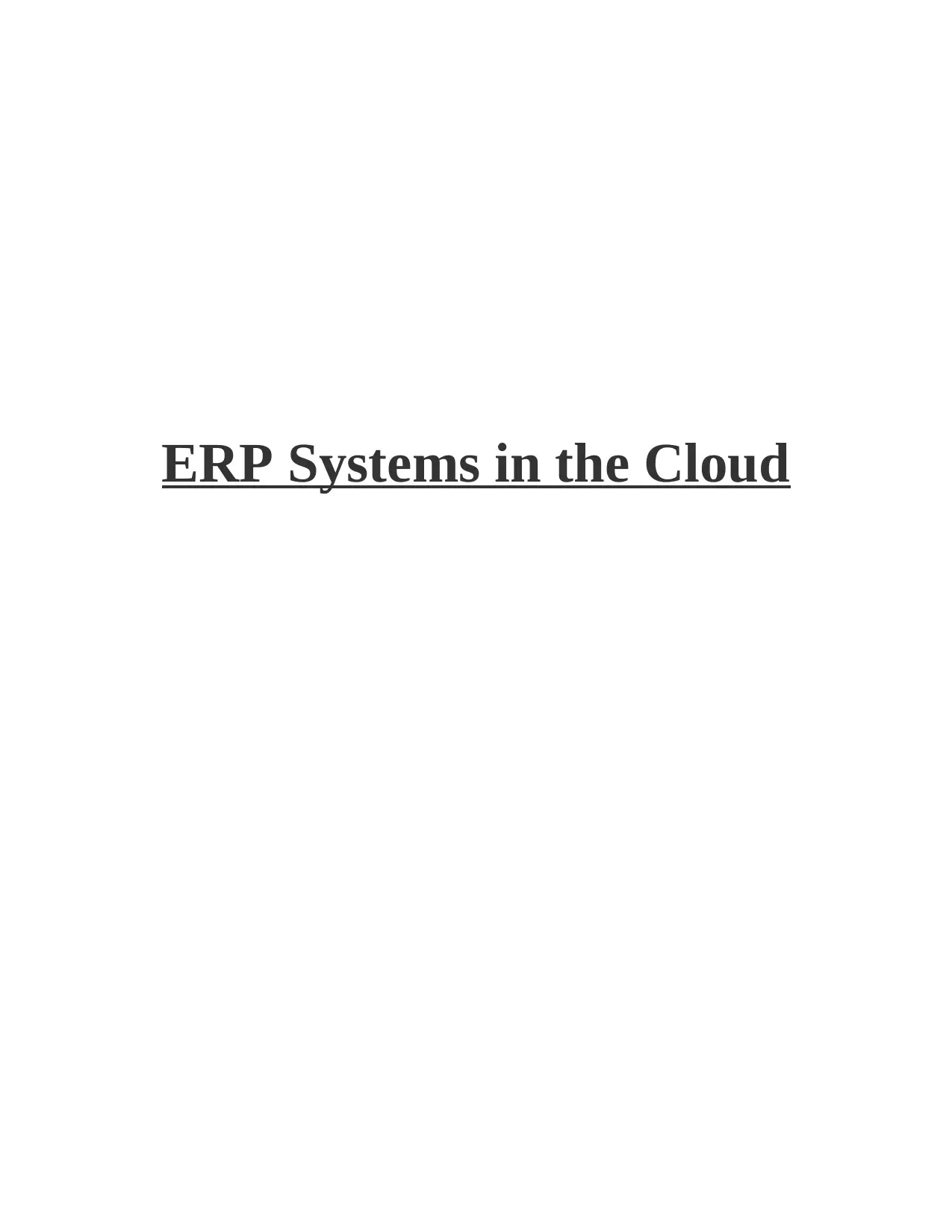
ERP Systems in the Cloud
Paraphrase This Document
Need a fresh take? Get an instant paraphrase of this document with our AI Paraphraser
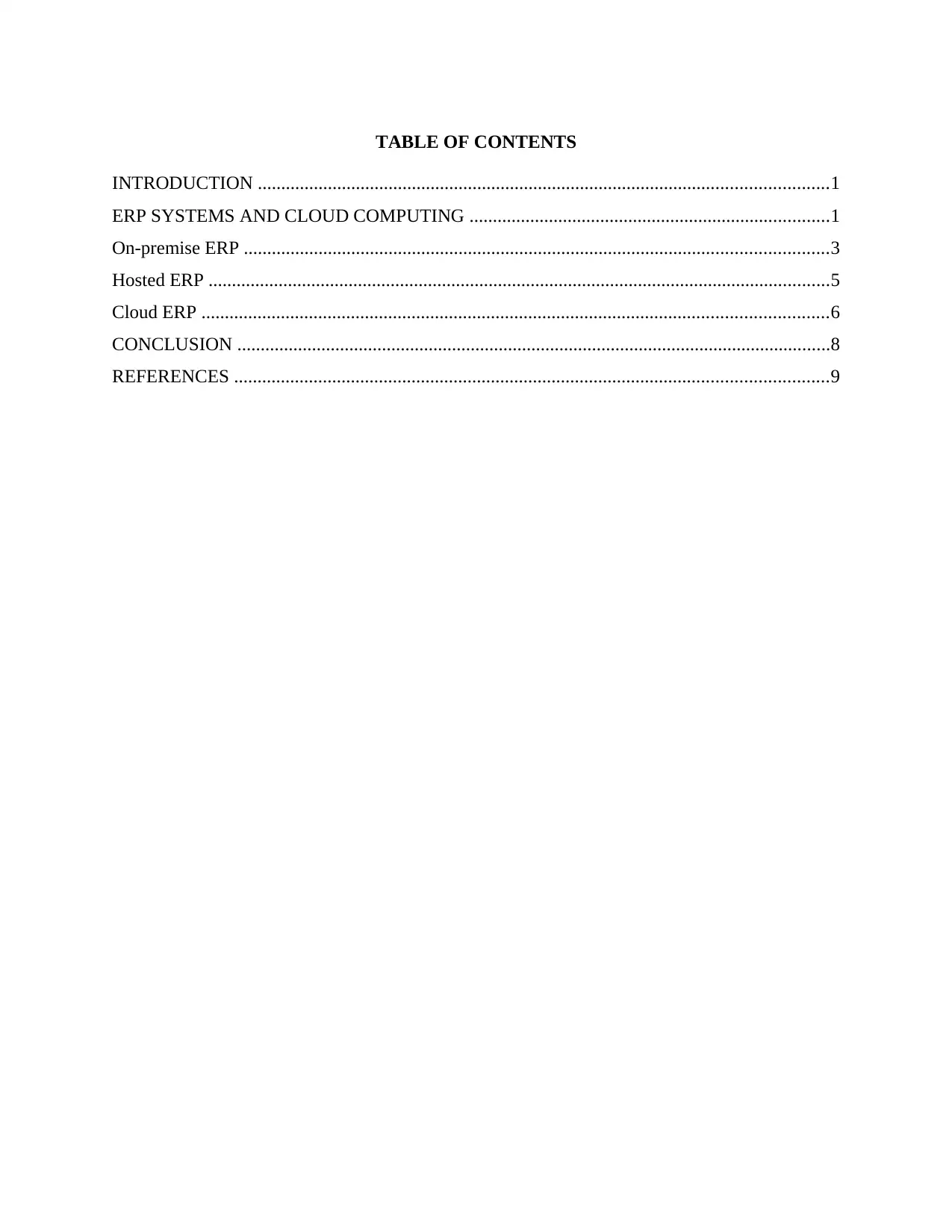
TABLE OF CONTENTS
INTRODUCTION ..........................................................................................................................1
ERP SYSTEMS AND CLOUD COMPUTING .............................................................................1
On-premise ERP .............................................................................................................................3
Hosted ERP .....................................................................................................................................5
Cloud ERP ......................................................................................................................................6
CONCLUSION ...............................................................................................................................8
REFERENCES ...............................................................................................................................9
INTRODUCTION ..........................................................................................................................1
ERP SYSTEMS AND CLOUD COMPUTING .............................................................................1
On-premise ERP .............................................................................................................................3
Hosted ERP .....................................................................................................................................5
Cloud ERP ......................................................................................................................................6
CONCLUSION ...............................................................................................................................8
REFERENCES ...............................................................................................................................9
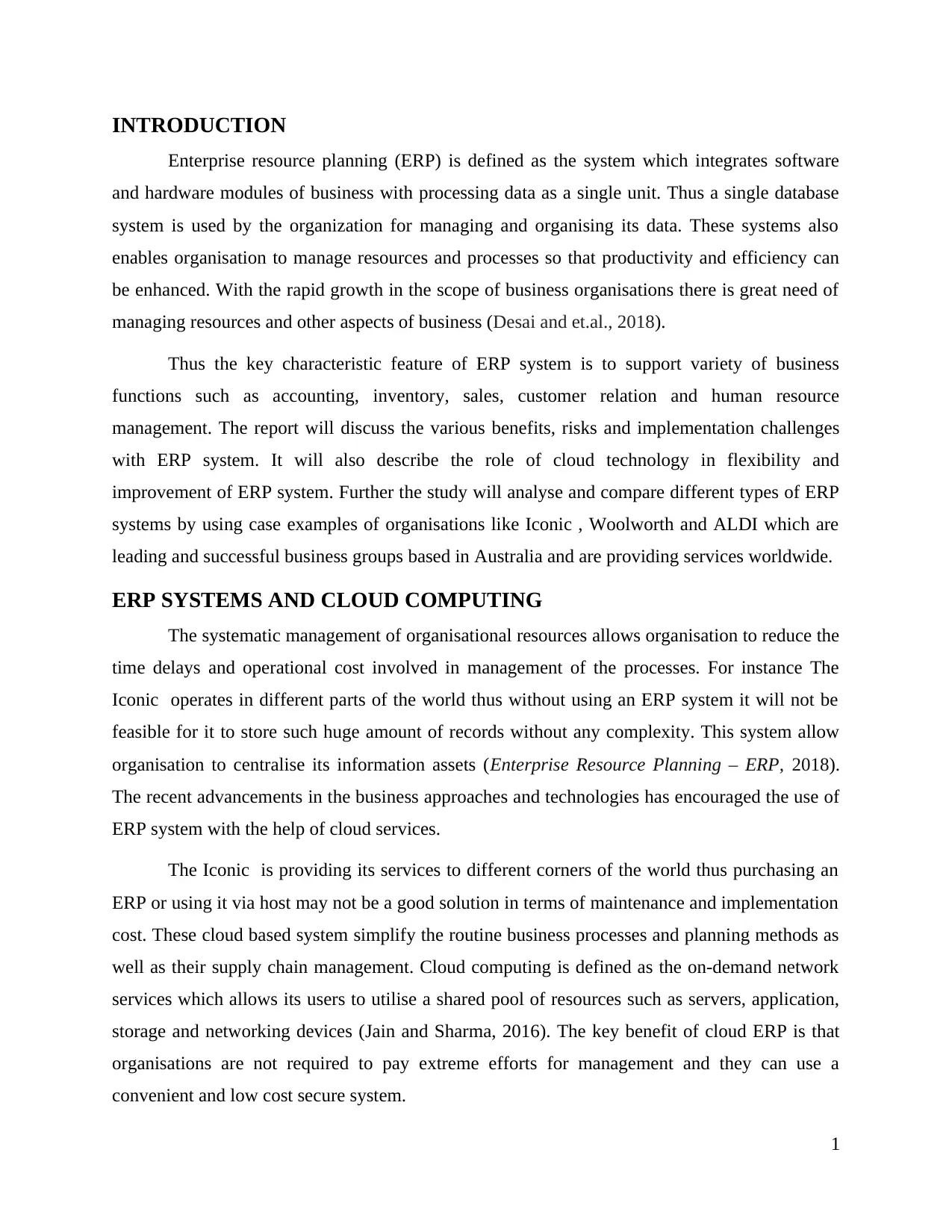
INTRODUCTION
Enterprise resource planning (ERP) is defined as the system which integrates software
and hardware modules of business with processing data as a single unit. Thus a single database
system is used by the organization for managing and organising its data. These systems also
enables organisation to manage resources and processes so that productivity and efficiency can
be enhanced. With the rapid growth in the scope of business organisations there is great need of
managing resources and other aspects of business (Desai and et.al., 2018).
Thus the key characteristic feature of ERP system is to support variety of business
functions such as accounting, inventory, sales, customer relation and human resource
management. The report will discuss the various benefits, risks and implementation challenges
with ERP system. It will also describe the role of cloud technology in flexibility and
improvement of ERP system. Further the study will analyse and compare different types of ERP
systems by using case examples of organisations like Iconic , Woolworth and ALDI which are
leading and successful business groups based in Australia and are providing services worldwide.
ERP SYSTEMS AND CLOUD COMPUTING
The systematic management of organisational resources allows organisation to reduce the
time delays and operational cost involved in management of the processes. For instance The
Iconic operates in different parts of the world thus without using an ERP system it will not be
feasible for it to store such huge amount of records without any complexity. This system allow
organisation to centralise its information assets (Enterprise Resource Planning – ERP, 2018).
The recent advancements in the business approaches and technologies has encouraged the use of
ERP system with the help of cloud services.
The Iconic is providing its services to different corners of the world thus purchasing an
ERP or using it via host may not be a good solution in terms of maintenance and implementation
cost. These cloud based system simplify the routine business processes and planning methods as
well as their supply chain management. Cloud computing is defined as the on-demand network
services which allows its users to utilise a shared pool of resources such as servers, application,
storage and networking devices (Jain and Sharma, 2016). The key benefit of cloud ERP is that
organisations are not required to pay extreme efforts for management and they can use a
convenient and low cost secure system.
1
Enterprise resource planning (ERP) is defined as the system which integrates software
and hardware modules of business with processing data as a single unit. Thus a single database
system is used by the organization for managing and organising its data. These systems also
enables organisation to manage resources and processes so that productivity and efficiency can
be enhanced. With the rapid growth in the scope of business organisations there is great need of
managing resources and other aspects of business (Desai and et.al., 2018).
Thus the key characteristic feature of ERP system is to support variety of business
functions such as accounting, inventory, sales, customer relation and human resource
management. The report will discuss the various benefits, risks and implementation challenges
with ERP system. It will also describe the role of cloud technology in flexibility and
improvement of ERP system. Further the study will analyse and compare different types of ERP
systems by using case examples of organisations like Iconic , Woolworth and ALDI which are
leading and successful business groups based in Australia and are providing services worldwide.
ERP SYSTEMS AND CLOUD COMPUTING
The systematic management of organisational resources allows organisation to reduce the
time delays and operational cost involved in management of the processes. For instance The
Iconic operates in different parts of the world thus without using an ERP system it will not be
feasible for it to store such huge amount of records without any complexity. This system allow
organisation to centralise its information assets (Enterprise Resource Planning – ERP, 2018).
The recent advancements in the business approaches and technologies has encouraged the use of
ERP system with the help of cloud services.
The Iconic is providing its services to different corners of the world thus purchasing an
ERP or using it via host may not be a good solution in terms of maintenance and implementation
cost. These cloud based system simplify the routine business processes and planning methods as
well as their supply chain management. Cloud computing is defined as the on-demand network
services which allows its users to utilise a shared pool of resources such as servers, application,
storage and networking devices (Jain and Sharma, 2016). The key benefit of cloud ERP is that
organisations are not required to pay extreme efforts for management and they can use a
convenient and low cost secure system.
1
⊘ This is a preview!⊘
Do you want full access?
Subscribe today to unlock all pages.

Trusted by 1+ million students worldwide
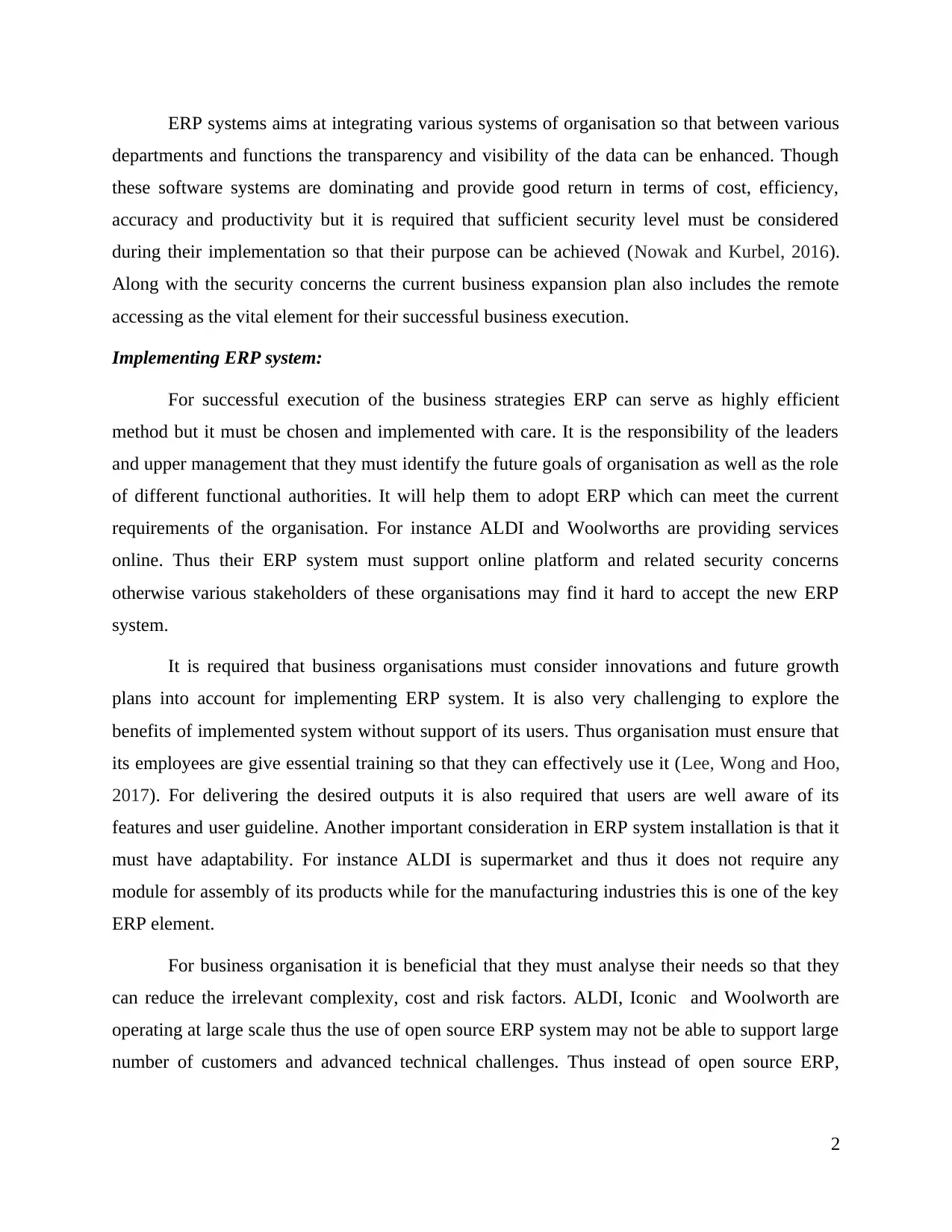
ERP systems aims at integrating various systems of organisation so that between various
departments and functions the transparency and visibility of the data can be enhanced. Though
these software systems are dominating and provide good return in terms of cost, efficiency,
accuracy and productivity but it is required that sufficient security level must be considered
during their implementation so that their purpose can be achieved (Nowak and Kurbel, 2016).
Along with the security concerns the current business expansion plan also includes the remote
accessing as the vital element for their successful business execution.
Implementing ERP system:
For successful execution of the business strategies ERP can serve as highly efficient
method but it must be chosen and implemented with care. It is the responsibility of the leaders
and upper management that they must identify the future goals of organisation as well as the role
of different functional authorities. It will help them to adopt ERP which can meet the current
requirements of the organisation. For instance ALDI and Woolworths are providing services
online. Thus their ERP system must support online platform and related security concerns
otherwise various stakeholders of these organisations may find it hard to accept the new ERP
system.
It is required that business organisations must consider innovations and future growth
plans into account for implementing ERP system. It is also very challenging to explore the
benefits of implemented system without support of its users. Thus organisation must ensure that
its employees are give essential training so that they can effectively use it (Lee, Wong and Hoo,
2017). For delivering the desired outputs it is also required that users are well aware of its
features and user guideline. Another important consideration in ERP system installation is that it
must have adaptability. For instance ALDI is supermarket and thus it does not require any
module for assembly of its products while for the manufacturing industries this is one of the key
ERP element.
For business organisation it is beneficial that they must analyse their needs so that they
can reduce the irrelevant complexity, cost and risk factors. ALDI, Iconic and Woolworth are
operating at large scale thus the use of open source ERP system may not be able to support large
number of customers and advanced technical challenges. Thus instead of open source ERP,
2
departments and functions the transparency and visibility of the data can be enhanced. Though
these software systems are dominating and provide good return in terms of cost, efficiency,
accuracy and productivity but it is required that sufficient security level must be considered
during their implementation so that their purpose can be achieved (Nowak and Kurbel, 2016).
Along with the security concerns the current business expansion plan also includes the remote
accessing as the vital element for their successful business execution.
Implementing ERP system:
For successful execution of the business strategies ERP can serve as highly efficient
method but it must be chosen and implemented with care. It is the responsibility of the leaders
and upper management that they must identify the future goals of organisation as well as the role
of different functional authorities. It will help them to adopt ERP which can meet the current
requirements of the organisation. For instance ALDI and Woolworths are providing services
online. Thus their ERP system must support online platform and related security concerns
otherwise various stakeholders of these organisations may find it hard to accept the new ERP
system.
It is required that business organisations must consider innovations and future growth
plans into account for implementing ERP system. It is also very challenging to explore the
benefits of implemented system without support of its users. Thus organisation must ensure that
its employees are give essential training so that they can effectively use it (Lee, Wong and Hoo,
2017). For delivering the desired outputs it is also required that users are well aware of its
features and user guideline. Another important consideration in ERP system installation is that it
must have adaptability. For instance ALDI is supermarket and thus it does not require any
module for assembly of its products while for the manufacturing industries this is one of the key
ERP element.
For business organisation it is beneficial that they must analyse their needs so that they
can reduce the irrelevant complexity, cost and risk factors. ALDI, Iconic and Woolworth are
operating at large scale thus the use of open source ERP system may not be able to support large
number of customers and advanced technical challenges. Thus instead of open source ERP,
2
Paraphrase This Document
Need a fresh take? Get an instant paraphrase of this document with our AI Paraphraser
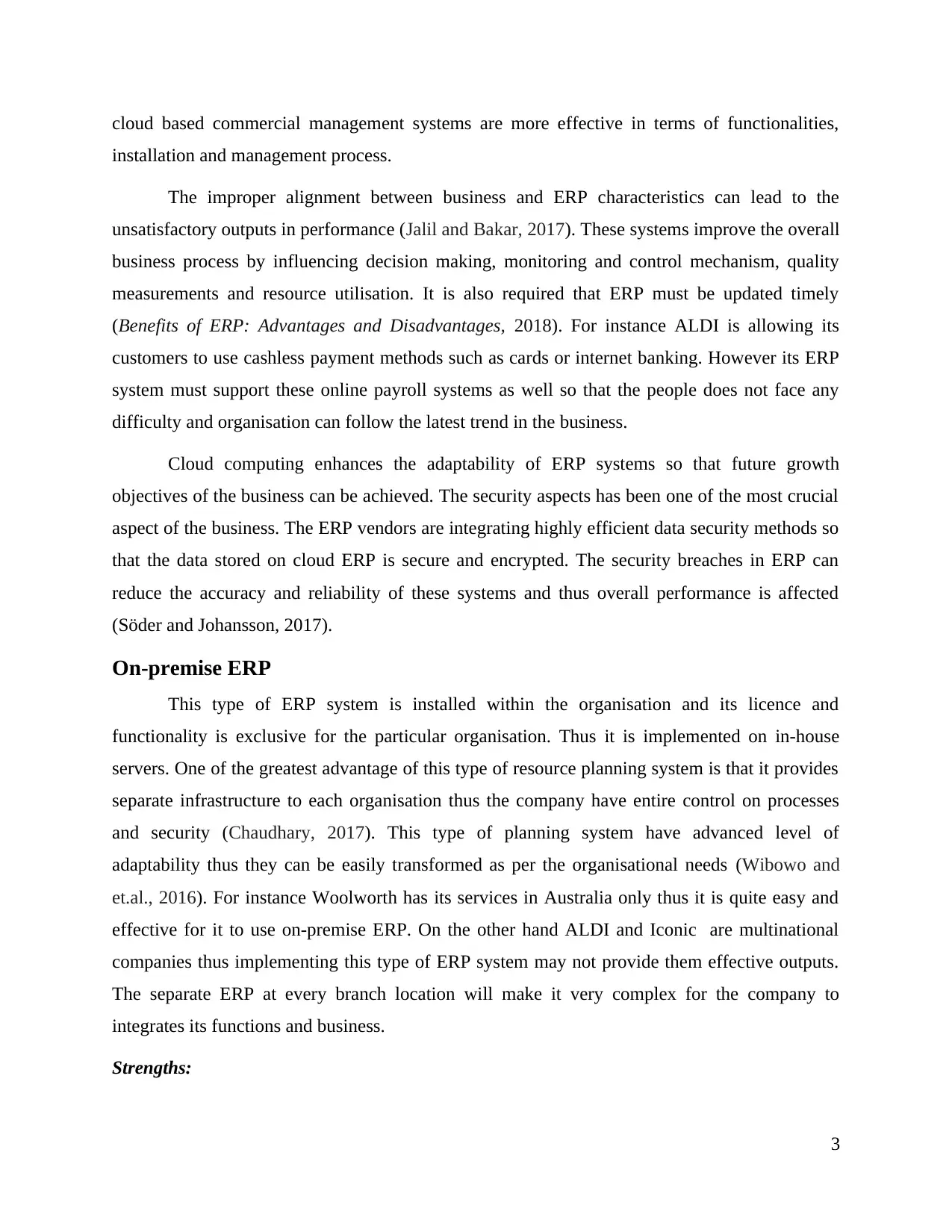
cloud based commercial management systems are more effective in terms of functionalities,
installation and management process.
The improper alignment between business and ERP characteristics can lead to the
unsatisfactory outputs in performance (Jalil and Bakar, 2017). These systems improve the overall
business process by influencing decision making, monitoring and control mechanism, quality
measurements and resource utilisation. It is also required that ERP must be updated timely
(Benefits of ERP: Advantages and Disadvantages, 2018). For instance ALDI is allowing its
customers to use cashless payment methods such as cards or internet banking. However its ERP
system must support these online payroll systems as well so that the people does not face any
difficulty and organisation can follow the latest trend in the business.
Cloud computing enhances the adaptability of ERP systems so that future growth
objectives of the business can be achieved. The security aspects has been one of the most crucial
aspect of the business. The ERP vendors are integrating highly efficient data security methods so
that the data stored on cloud ERP is secure and encrypted. The security breaches in ERP can
reduce the accuracy and reliability of these systems and thus overall performance is affected
(Söder and Johansson, 2017).
On-premise ERP
This type of ERP system is installed within the organisation and its licence and
functionality is exclusive for the particular organisation. Thus it is implemented on in-house
servers. One of the greatest advantage of this type of resource planning system is that it provides
separate infrastructure to each organisation thus the company have entire control on processes
and security (Chaudhary, 2017). This type of planning system have advanced level of
adaptability thus they can be easily transformed as per the organisational needs (Wibowo and
et.al., 2016). For instance Woolworth has its services in Australia only thus it is quite easy and
effective for it to use on-premise ERP. On the other hand ALDI and Iconic are multinational
companies thus implementing this type of ERP system may not provide them effective outputs.
The separate ERP at every branch location will make it very complex for the company to
integrates its functions and business.
Strengths:
3
installation and management process.
The improper alignment between business and ERP characteristics can lead to the
unsatisfactory outputs in performance (Jalil and Bakar, 2017). These systems improve the overall
business process by influencing decision making, monitoring and control mechanism, quality
measurements and resource utilisation. It is also required that ERP must be updated timely
(Benefits of ERP: Advantages and Disadvantages, 2018). For instance ALDI is allowing its
customers to use cashless payment methods such as cards or internet banking. However its ERP
system must support these online payroll systems as well so that the people does not face any
difficulty and organisation can follow the latest trend in the business.
Cloud computing enhances the adaptability of ERP systems so that future growth
objectives of the business can be achieved. The security aspects has been one of the most crucial
aspect of the business. The ERP vendors are integrating highly efficient data security methods so
that the data stored on cloud ERP is secure and encrypted. The security breaches in ERP can
reduce the accuracy and reliability of these systems and thus overall performance is affected
(Söder and Johansson, 2017).
On-premise ERP
This type of ERP system is installed within the organisation and its licence and
functionality is exclusive for the particular organisation. Thus it is implemented on in-house
servers. One of the greatest advantage of this type of resource planning system is that it provides
separate infrastructure to each organisation thus the company have entire control on processes
and security (Chaudhary, 2017). This type of planning system have advanced level of
adaptability thus they can be easily transformed as per the organisational needs (Wibowo and
et.al., 2016). For instance Woolworth has its services in Australia only thus it is quite easy and
effective for it to use on-premise ERP. On the other hand ALDI and Iconic are multinational
companies thus implementing this type of ERP system may not provide them effective outputs.
The separate ERP at every branch location will make it very complex for the company to
integrates its functions and business.
Strengths:
3
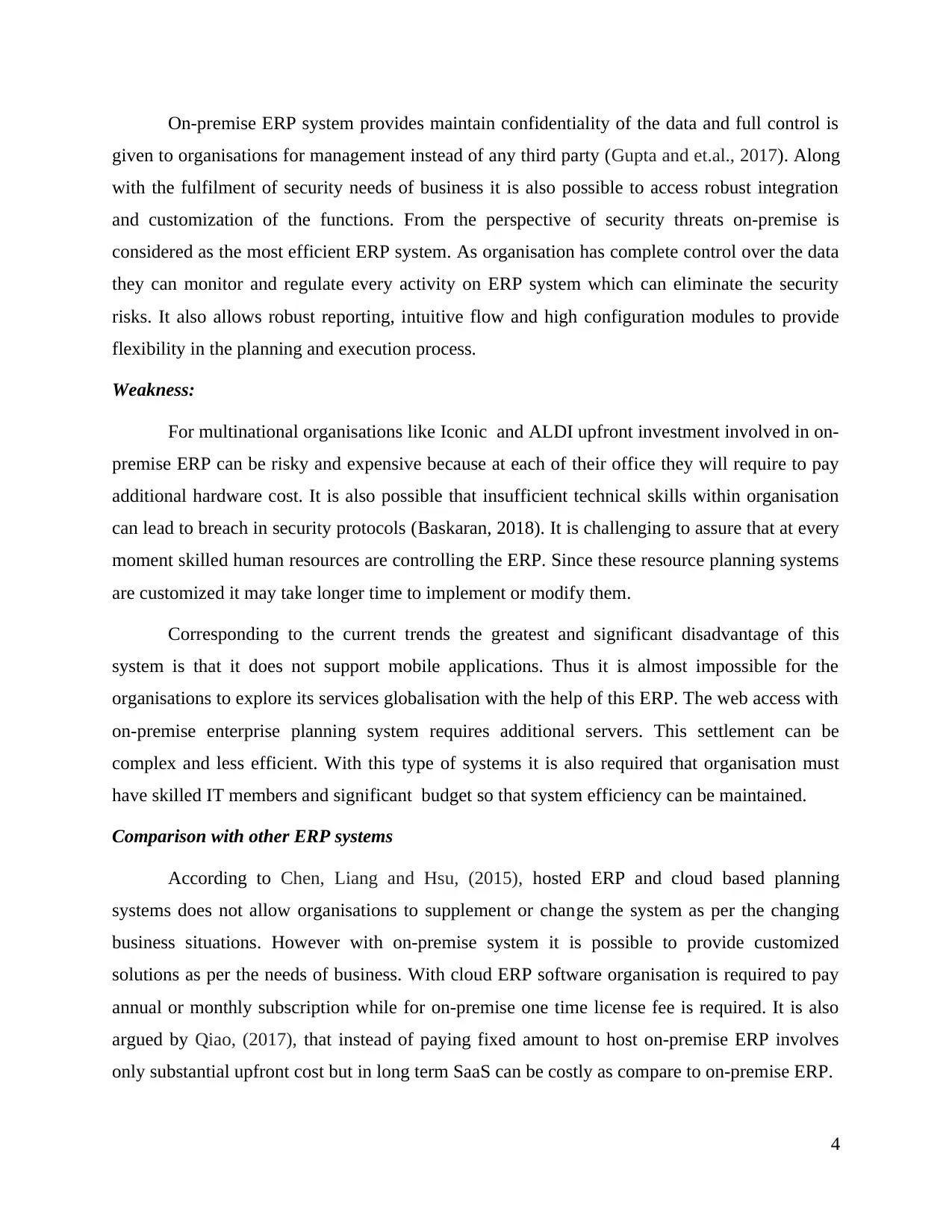
On-premise ERP system provides maintain confidentiality of the data and full control is
given to organisations for management instead of any third party (Gupta and et.al., 2017). Along
with the fulfilment of security needs of business it is also possible to access robust integration
and customization of the functions. From the perspective of security threats on-premise is
considered as the most efficient ERP system. As organisation has complete control over the data
they can monitor and regulate every activity on ERP system which can eliminate the security
risks. It also allows robust reporting, intuitive flow and high configuration modules to provide
flexibility in the planning and execution process.
Weakness:
For multinational organisations like Iconic and ALDI upfront investment involved in on-
premise ERP can be risky and expensive because at each of their office they will require to pay
additional hardware cost. It is also possible that insufficient technical skills within organisation
can lead to breach in security protocols (Baskaran, 2018). It is challenging to assure that at every
moment skilled human resources are controlling the ERP. Since these resource planning systems
are customized it may take longer time to implement or modify them.
Corresponding to the current trends the greatest and significant disadvantage of this
system is that it does not support mobile applications. Thus it is almost impossible for the
organisations to explore its services globalisation with the help of this ERP. The web access with
on-premise enterprise planning system requires additional servers. This settlement can be
complex and less efficient. With this type of systems it is also required that organisation must
have skilled IT members and significant budget so that system efficiency can be maintained.
Comparison with other ERP systems
According to Chen, Liang and Hsu, (2015), hosted ERP and cloud based planning
systems does not allow organisations to supplement or change the system as per the changing
business situations. However with on-premise system it is possible to provide customized
solutions as per the needs of business. With cloud ERP software organisation is required to pay
annual or monthly subscription while for on-premise one time license fee is required. It is also
argued by Qiao, (2017), that instead of paying fixed amount to host on-premise ERP involves
only substantial upfront cost but in long term SaaS can be costly as compare to on-premise ERP.
4
given to organisations for management instead of any third party (Gupta and et.al., 2017). Along
with the fulfilment of security needs of business it is also possible to access robust integration
and customization of the functions. From the perspective of security threats on-premise is
considered as the most efficient ERP system. As organisation has complete control over the data
they can monitor and regulate every activity on ERP system which can eliminate the security
risks. It also allows robust reporting, intuitive flow and high configuration modules to provide
flexibility in the planning and execution process.
Weakness:
For multinational organisations like Iconic and ALDI upfront investment involved in on-
premise ERP can be risky and expensive because at each of their office they will require to pay
additional hardware cost. It is also possible that insufficient technical skills within organisation
can lead to breach in security protocols (Baskaran, 2018). It is challenging to assure that at every
moment skilled human resources are controlling the ERP. Since these resource planning systems
are customized it may take longer time to implement or modify them.
Corresponding to the current trends the greatest and significant disadvantage of this
system is that it does not support mobile applications. Thus it is almost impossible for the
organisations to explore its services globalisation with the help of this ERP. The web access with
on-premise enterprise planning system requires additional servers. This settlement can be
complex and less efficient. With this type of systems it is also required that organisation must
have skilled IT members and significant budget so that system efficiency can be maintained.
Comparison with other ERP systems
According to Chen, Liang and Hsu, (2015), hosted ERP and cloud based planning
systems does not allow organisations to supplement or change the system as per the changing
business situations. However with on-premise system it is possible to provide customized
solutions as per the needs of business. With cloud ERP software organisation is required to pay
annual or monthly subscription while for on-premise one time license fee is required. It is also
argued by Qiao, (2017), that instead of paying fixed amount to host on-premise ERP involves
only substantial upfront cost but in long term SaaS can be costly as compare to on-premise ERP.
4
⊘ This is a preview!⊘
Do you want full access?
Subscribe today to unlock all pages.

Trusted by 1+ million students worldwide
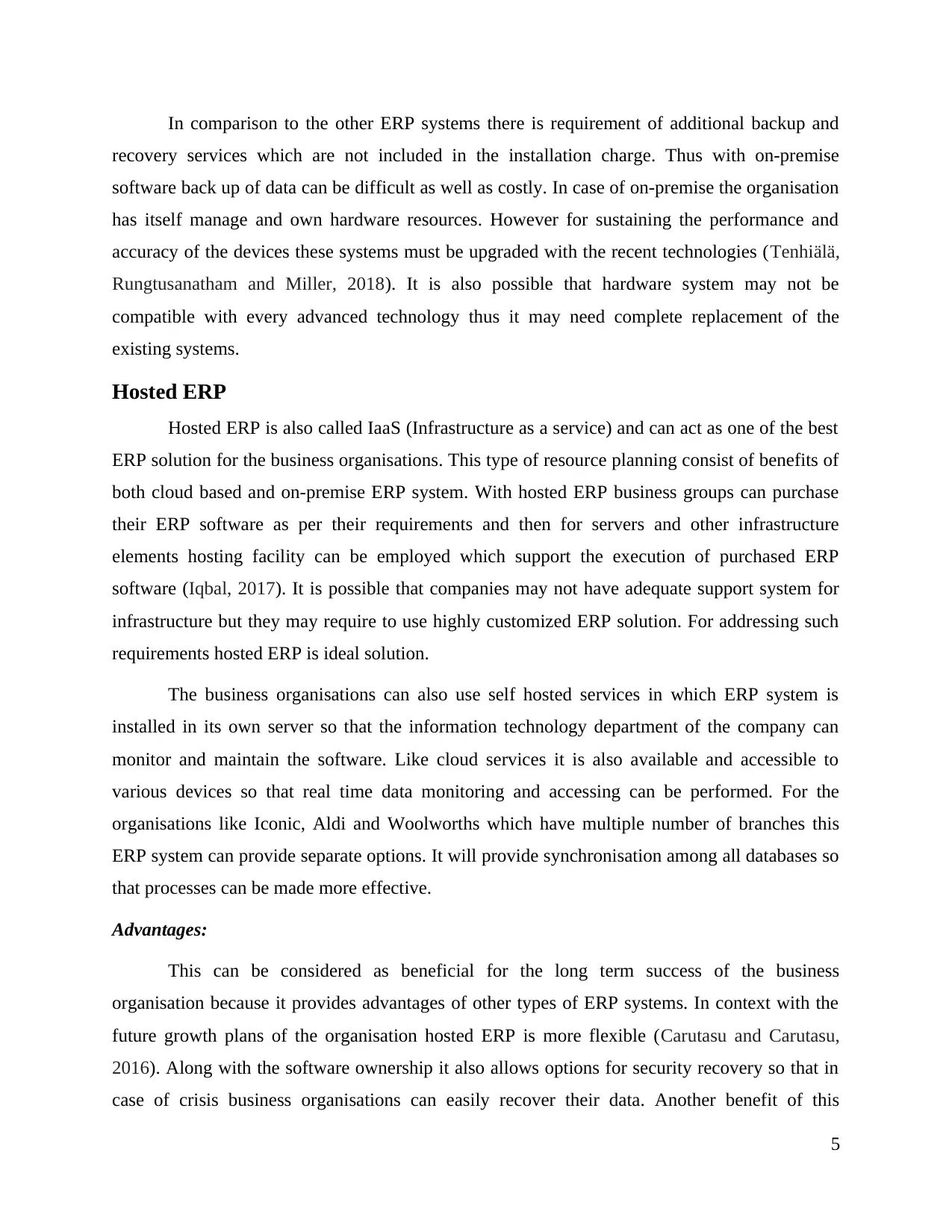
In comparison to the other ERP systems there is requirement of additional backup and
recovery services which are not included in the installation charge. Thus with on-premise
software back up of data can be difficult as well as costly. In case of on-premise the organisation
has itself manage and own hardware resources. However for sustaining the performance and
accuracy of the devices these systems must be upgraded with the recent technologies (Tenhiälä,
Rungtusanatham and Miller, 2018). It is also possible that hardware system may not be
compatible with every advanced technology thus it may need complete replacement of the
existing systems.
Hosted ERP
Hosted ERP is also called IaaS (Infrastructure as a service) and can act as one of the best
ERP solution for the business organisations. This type of resource planning consist of benefits of
both cloud based and on-premise ERP system. With hosted ERP business groups can purchase
their ERP software as per their requirements and then for servers and other infrastructure
elements hosting facility can be employed which support the execution of purchased ERP
software (Iqbal, 2017). It is possible that companies may not have adequate support system for
infrastructure but they may require to use highly customized ERP solution. For addressing such
requirements hosted ERP is ideal solution.
The business organisations can also use self hosted services in which ERP system is
installed in its own server so that the information technology department of the company can
monitor and maintain the software. Like cloud services it is also available and accessible to
various devices so that real time data monitoring and accessing can be performed. For the
organisations like Iconic, Aldi and Woolworths which have multiple number of branches this
ERP system can provide separate options. It will provide synchronisation among all databases so
that processes can be made more effective.
Advantages:
This can be considered as beneficial for the long term success of the business
organisation because it provides advantages of other types of ERP systems. In context with the
future growth plans of the organisation hosted ERP is more flexible (Carutasu and Carutasu,
2016). Along with the software ownership it also allows options for security recovery so that in
case of crisis business organisations can easily recover their data. Another benefit of this
5
recovery services which are not included in the installation charge. Thus with on-premise
software back up of data can be difficult as well as costly. In case of on-premise the organisation
has itself manage and own hardware resources. However for sustaining the performance and
accuracy of the devices these systems must be upgraded with the recent technologies (Tenhiälä,
Rungtusanatham and Miller, 2018). It is also possible that hardware system may not be
compatible with every advanced technology thus it may need complete replacement of the
existing systems.
Hosted ERP
Hosted ERP is also called IaaS (Infrastructure as a service) and can act as one of the best
ERP solution for the business organisations. This type of resource planning consist of benefits of
both cloud based and on-premise ERP system. With hosted ERP business groups can purchase
their ERP software as per their requirements and then for servers and other infrastructure
elements hosting facility can be employed which support the execution of purchased ERP
software (Iqbal, 2017). It is possible that companies may not have adequate support system for
infrastructure but they may require to use highly customized ERP solution. For addressing such
requirements hosted ERP is ideal solution.
The business organisations can also use self hosted services in which ERP system is
installed in its own server so that the information technology department of the company can
monitor and maintain the software. Like cloud services it is also available and accessible to
various devices so that real time data monitoring and accessing can be performed. For the
organisations like Iconic, Aldi and Woolworths which have multiple number of branches this
ERP system can provide separate options. It will provide synchronisation among all databases so
that processes can be made more effective.
Advantages:
This can be considered as beneficial for the long term success of the business
organisation because it provides advantages of other types of ERP systems. In context with the
future growth plans of the organisation hosted ERP is more flexible (Carutasu and Carutasu,
2016). Along with the software ownership it also allows options for security recovery so that in
case of crisis business organisations can easily recover their data. Another benefit of this
5
Paraphrase This Document
Need a fresh take? Get an instant paraphrase of this document with our AI Paraphraser
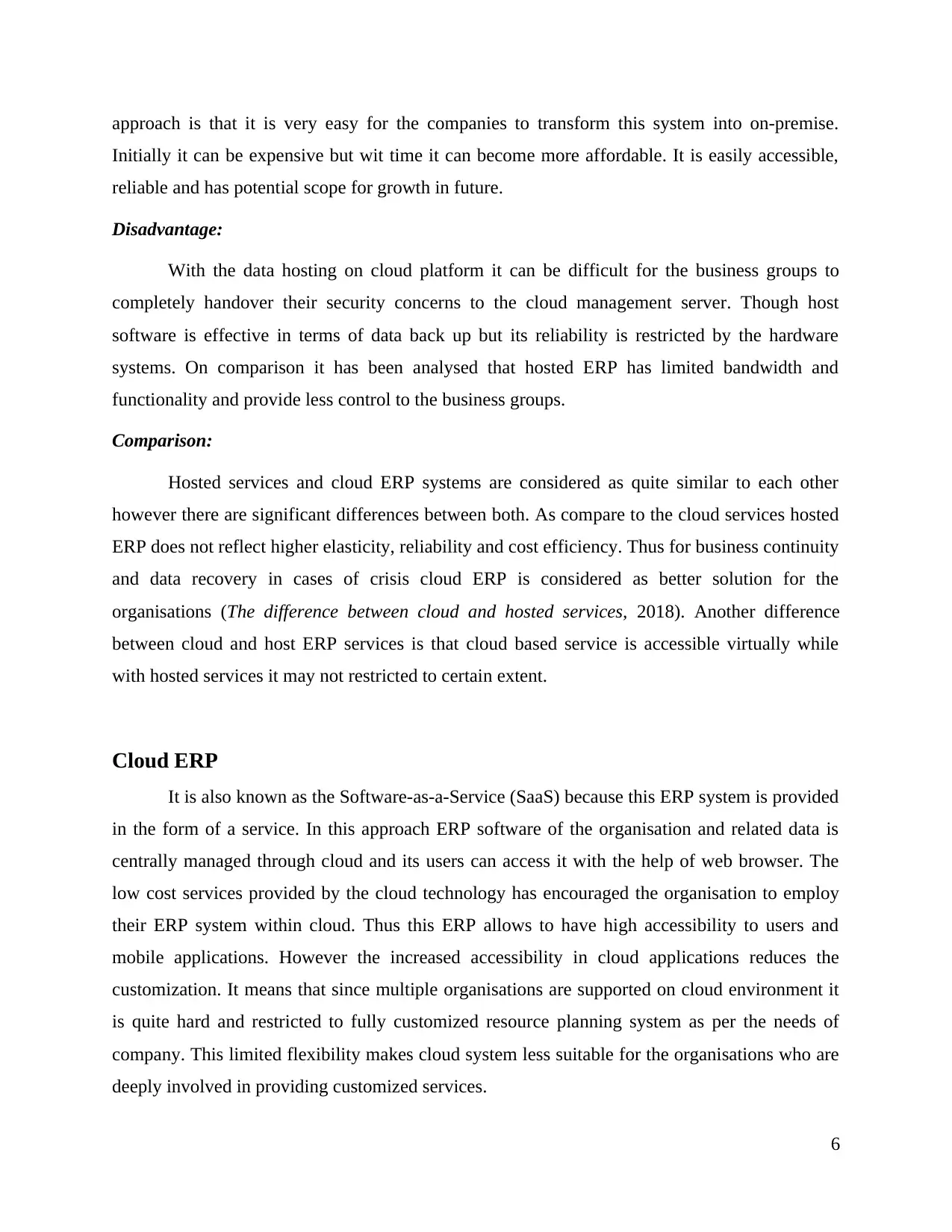
approach is that it is very easy for the companies to transform this system into on-premise.
Initially it can be expensive but wit time it can become more affordable. It is easily accessible,
reliable and has potential scope for growth in future.
Disadvantage:
With the data hosting on cloud platform it can be difficult for the business groups to
completely handover their security concerns to the cloud management server. Though host
software is effective in terms of data back up but its reliability is restricted by the hardware
systems. On comparison it has been analysed that hosted ERP has limited bandwidth and
functionality and provide less control to the business groups.
Comparison:
Hosted services and cloud ERP systems are considered as quite similar to each other
however there are significant differences between both. As compare to the cloud services hosted
ERP does not reflect higher elasticity, reliability and cost efficiency. Thus for business continuity
and data recovery in cases of crisis cloud ERP is considered as better solution for the
organisations (The difference between cloud and hosted services, 2018). Another difference
between cloud and host ERP services is that cloud based service is accessible virtually while
with hosted services it may not restricted to certain extent.
Cloud ERP
It is also known as the Software-as-a-Service (SaaS) because this ERP system is provided
in the form of a service. In this approach ERP software of the organisation and related data is
centrally managed through cloud and its users can access it with the help of web browser. The
low cost services provided by the cloud technology has encouraged the organisation to employ
their ERP system within cloud. Thus this ERP allows to have high accessibility to users and
mobile applications. However the increased accessibility in cloud applications reduces the
customization. It means that since multiple organisations are supported on cloud environment it
is quite hard and restricted to fully customized resource planning system as per the needs of
company. This limited flexibility makes cloud system less suitable for the organisations who are
deeply involved in providing customized services.
6
Initially it can be expensive but wit time it can become more affordable. It is easily accessible,
reliable and has potential scope for growth in future.
Disadvantage:
With the data hosting on cloud platform it can be difficult for the business groups to
completely handover their security concerns to the cloud management server. Though host
software is effective in terms of data back up but its reliability is restricted by the hardware
systems. On comparison it has been analysed that hosted ERP has limited bandwidth and
functionality and provide less control to the business groups.
Comparison:
Hosted services and cloud ERP systems are considered as quite similar to each other
however there are significant differences between both. As compare to the cloud services hosted
ERP does not reflect higher elasticity, reliability and cost efficiency. Thus for business continuity
and data recovery in cases of crisis cloud ERP is considered as better solution for the
organisations (The difference between cloud and hosted services, 2018). Another difference
between cloud and host ERP services is that cloud based service is accessible virtually while
with hosted services it may not restricted to certain extent.
Cloud ERP
It is also known as the Software-as-a-Service (SaaS) because this ERP system is provided
in the form of a service. In this approach ERP software of the organisation and related data is
centrally managed through cloud and its users can access it with the help of web browser. The
low cost services provided by the cloud technology has encouraged the organisation to employ
their ERP system within cloud. Thus this ERP allows to have high accessibility to users and
mobile applications. However the increased accessibility in cloud applications reduces the
customization. It means that since multiple organisations are supported on cloud environment it
is quite hard and restricted to fully customized resource planning system as per the needs of
company. This limited flexibility makes cloud system less suitable for the organisations who are
deeply involved in providing customized services.
6
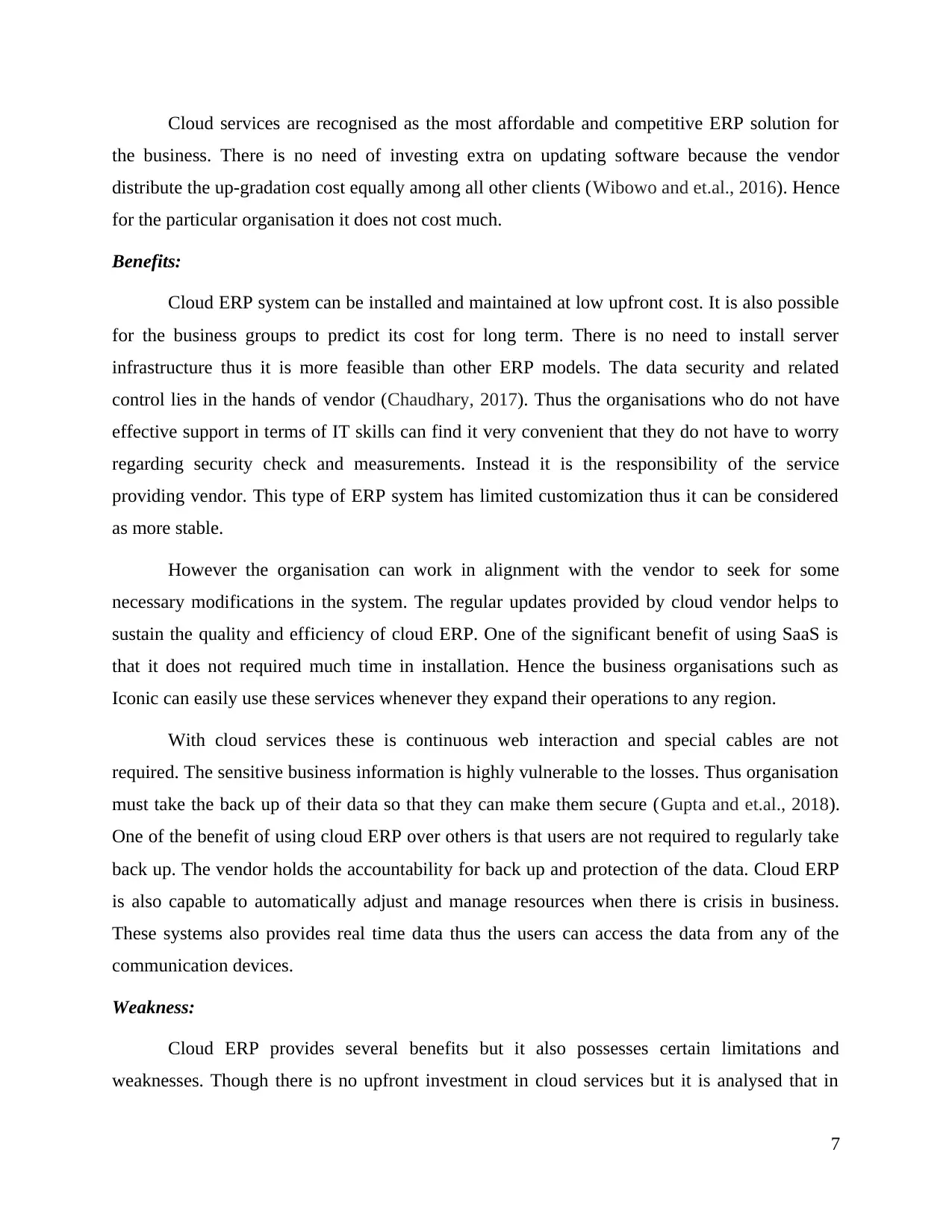
Cloud services are recognised as the most affordable and competitive ERP solution for
the business. There is no need of investing extra on updating software because the vendor
distribute the up-gradation cost equally among all other clients (Wibowo and et.al., 2016). Hence
for the particular organisation it does not cost much.
Benefits:
Cloud ERP system can be installed and maintained at low upfront cost. It is also possible
for the business groups to predict its cost for long term. There is no need to install server
infrastructure thus it is more feasible than other ERP models. The data security and related
control lies in the hands of vendor (Chaudhary, 2017). Thus the organisations who do not have
effective support in terms of IT skills can find it very convenient that they do not have to worry
regarding security check and measurements. Instead it is the responsibility of the service
providing vendor. This type of ERP system has limited customization thus it can be considered
as more stable.
However the organisation can work in alignment with the vendor to seek for some
necessary modifications in the system. The regular updates provided by cloud vendor helps to
sustain the quality and efficiency of cloud ERP. One of the significant benefit of using SaaS is
that it does not required much time in installation. Hence the business organisations such as
Iconic can easily use these services whenever they expand their operations to any region.
With cloud services these is continuous web interaction and special cables are not
required. The sensitive business information is highly vulnerable to the losses. Thus organisation
must take the back up of their data so that they can make them secure (Gupta and et.al., 2018).
One of the benefit of using cloud ERP over others is that users are not required to regularly take
back up. The vendor holds the accountability for back up and protection of the data. Cloud ERP
is also capable to automatically adjust and manage resources when there is crisis in business.
These systems also provides real time data thus the users can access the data from any of the
communication devices.
Weakness:
Cloud ERP provides several benefits but it also possesses certain limitations and
weaknesses. Though there is no upfront investment in cloud services but it is analysed that in
7
the business. There is no need of investing extra on updating software because the vendor
distribute the up-gradation cost equally among all other clients (Wibowo and et.al., 2016). Hence
for the particular organisation it does not cost much.
Benefits:
Cloud ERP system can be installed and maintained at low upfront cost. It is also possible
for the business groups to predict its cost for long term. There is no need to install server
infrastructure thus it is more feasible than other ERP models. The data security and related
control lies in the hands of vendor (Chaudhary, 2017). Thus the organisations who do not have
effective support in terms of IT skills can find it very convenient that they do not have to worry
regarding security check and measurements. Instead it is the responsibility of the service
providing vendor. This type of ERP system has limited customization thus it can be considered
as more stable.
However the organisation can work in alignment with the vendor to seek for some
necessary modifications in the system. The regular updates provided by cloud vendor helps to
sustain the quality and efficiency of cloud ERP. One of the significant benefit of using SaaS is
that it does not required much time in installation. Hence the business organisations such as
Iconic can easily use these services whenever they expand their operations to any region.
With cloud services these is continuous web interaction and special cables are not
required. The sensitive business information is highly vulnerable to the losses. Thus organisation
must take the back up of their data so that they can make them secure (Gupta and et.al., 2018).
One of the benefit of using cloud ERP over others is that users are not required to regularly take
back up. The vendor holds the accountability for back up and protection of the data. Cloud ERP
is also capable to automatically adjust and manage resources when there is crisis in business.
These systems also provides real time data thus the users can access the data from any of the
communication devices.
Weakness:
Cloud ERP provides several benefits but it also possesses certain limitations and
weaknesses. Though there is no upfront investment in cloud services but it is analysed that in
7
⊘ This is a preview!⊘
Do you want full access?
Subscribe today to unlock all pages.

Trusted by 1+ million students worldwide
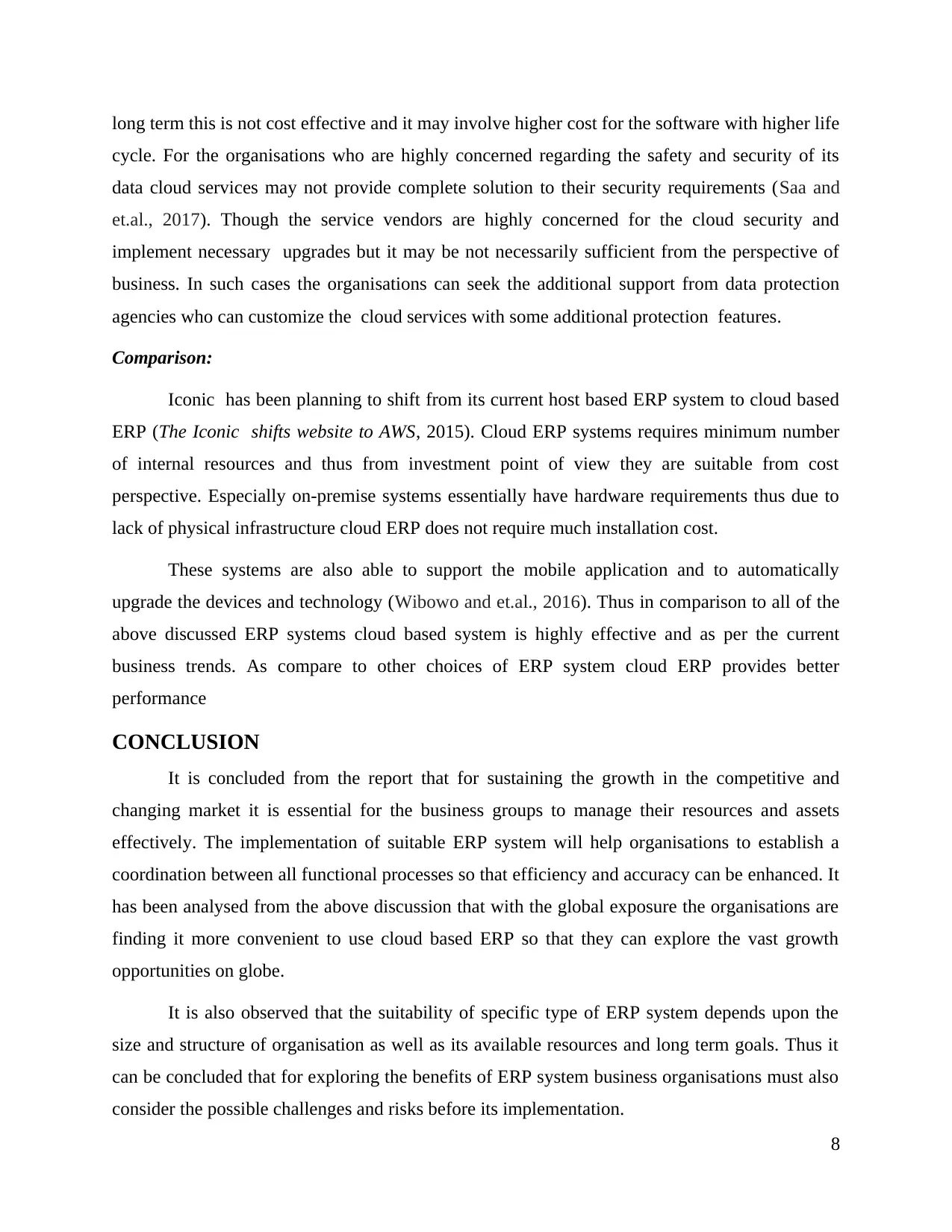
long term this is not cost effective and it may involve higher cost for the software with higher life
cycle. For the organisations who are highly concerned regarding the safety and security of its
data cloud services may not provide complete solution to their security requirements (Saa and
et.al., 2017). Though the service vendors are highly concerned for the cloud security and
implement necessary upgrades but it may be not necessarily sufficient from the perspective of
business. In such cases the organisations can seek the additional support from data protection
agencies who can customize the cloud services with some additional protection features.
Comparison:
Iconic has been planning to shift from its current host based ERP system to cloud based
ERP (The Iconic shifts website to AWS, 2015). Cloud ERP systems requires minimum number
of internal resources and thus from investment point of view they are suitable from cost
perspective. Especially on-premise systems essentially have hardware requirements thus due to
lack of physical infrastructure cloud ERP does not require much installation cost.
These systems are also able to support the mobile application and to automatically
upgrade the devices and technology (Wibowo and et.al., 2016). Thus in comparison to all of the
above discussed ERP systems cloud based system is highly effective and as per the current
business trends. As compare to other choices of ERP system cloud ERP provides better
performance
CONCLUSION
It is concluded from the report that for sustaining the growth in the competitive and
changing market it is essential for the business groups to manage their resources and assets
effectively. The implementation of suitable ERP system will help organisations to establish a
coordination between all functional processes so that efficiency and accuracy can be enhanced. It
has been analysed from the above discussion that with the global exposure the organisations are
finding it more convenient to use cloud based ERP so that they can explore the vast growth
opportunities on globe.
It is also observed that the suitability of specific type of ERP system depends upon the
size and structure of organisation as well as its available resources and long term goals. Thus it
can be concluded that for exploring the benefits of ERP system business organisations must also
consider the possible challenges and risks before its implementation.
8
cycle. For the organisations who are highly concerned regarding the safety and security of its
data cloud services may not provide complete solution to their security requirements (Saa and
et.al., 2017). Though the service vendors are highly concerned for the cloud security and
implement necessary upgrades but it may be not necessarily sufficient from the perspective of
business. In such cases the organisations can seek the additional support from data protection
agencies who can customize the cloud services with some additional protection features.
Comparison:
Iconic has been planning to shift from its current host based ERP system to cloud based
ERP (The Iconic shifts website to AWS, 2015). Cloud ERP systems requires minimum number
of internal resources and thus from investment point of view they are suitable from cost
perspective. Especially on-premise systems essentially have hardware requirements thus due to
lack of physical infrastructure cloud ERP does not require much installation cost.
These systems are also able to support the mobile application and to automatically
upgrade the devices and technology (Wibowo and et.al., 2016). Thus in comparison to all of the
above discussed ERP systems cloud based system is highly effective and as per the current
business trends. As compare to other choices of ERP system cloud ERP provides better
performance
CONCLUSION
It is concluded from the report that for sustaining the growth in the competitive and
changing market it is essential for the business groups to manage their resources and assets
effectively. The implementation of suitable ERP system will help organisations to establish a
coordination between all functional processes so that efficiency and accuracy can be enhanced. It
has been analysed from the above discussion that with the global exposure the organisations are
finding it more convenient to use cloud based ERP so that they can explore the vast growth
opportunities on globe.
It is also observed that the suitability of specific type of ERP system depends upon the
size and structure of organisation as well as its available resources and long term goals. Thus it
can be concluded that for exploring the benefits of ERP system business organisations must also
consider the possible challenges and risks before its implementation.
8
Paraphrase This Document
Need a fresh take? Get an instant paraphrase of this document with our AI Paraphraser
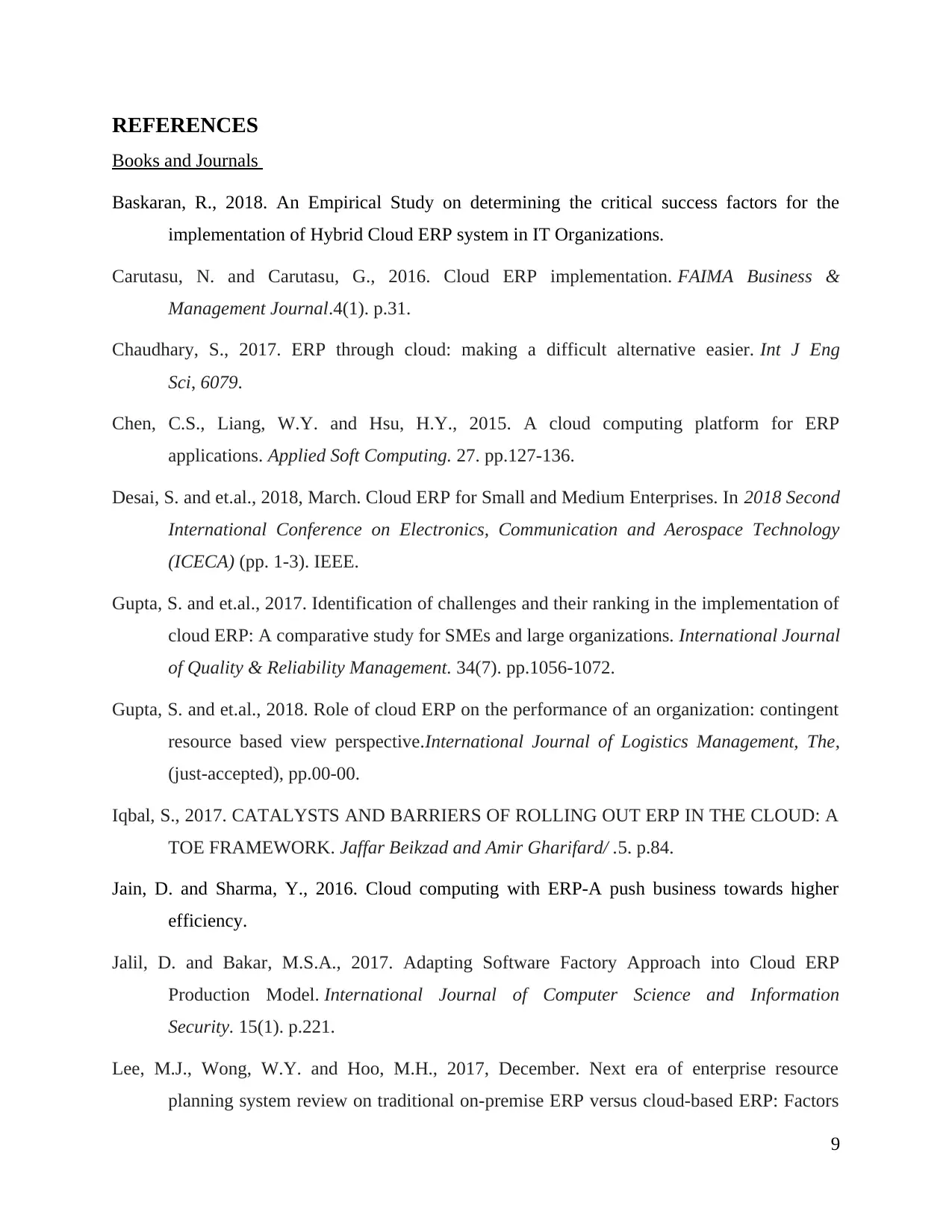
REFERENCES
Books and Journals
Baskaran, R., 2018. An Empirical Study on determining the critical success factors for the
implementation of Hybrid Cloud ERP system in IT Organizations.
Carutasu, N. and Carutasu, G., 2016. Cloud ERP implementation. FAIMA Business &
Management Journal.4(1). p.31.
Chaudhary, S., 2017. ERP through cloud: making a difficult alternative easier. Int J Eng
Sci, 6079.
Chen, C.S., Liang, W.Y. and Hsu, H.Y., 2015. A cloud computing platform for ERP
applications. Applied Soft Computing. 27. pp.127-136.
Desai, S. and et.al., 2018, March. Cloud ERP for Small and Medium Enterprises. In 2018 Second
International Conference on Electronics, Communication and Aerospace Technology
(ICECA) (pp. 1-3). IEEE.
Gupta, S. and et.al., 2017. Identification of challenges and their ranking in the implementation of
cloud ERP: A comparative study for SMEs and large organizations. International Journal
of Quality & Reliability Management. 34(7). pp.1056-1072.
Gupta, S. and et.al., 2018. Role of cloud ERP on the performance of an organization: contingent
resource based view perspective.International Journal of Logistics Management, The,
(just-accepted), pp.00-00.
Iqbal, S., 2017. CATALYSTS AND BARRIERS OF ROLLING OUT ERP IN THE CLOUD: A
TOE FRAMEWORK. Jaffar Beikzad and Amir Gharifard/ .5. p.84.
Jain, D. and Sharma, Y., 2016. Cloud computing with ERP-A push business towards higher
efficiency.
Jalil, D. and Bakar, M.S.A., 2017. Adapting Software Factory Approach into Cloud ERP
Production Model. International Journal of Computer Science and Information
Security. 15(1). p.221.
Lee, M.J., Wong, W.Y. and Hoo, M.H., 2017, December. Next era of enterprise resource
planning system review on traditional on-premise ERP versus cloud-based ERP: Factors
9
Books and Journals
Baskaran, R., 2018. An Empirical Study on determining the critical success factors for the
implementation of Hybrid Cloud ERP system in IT Organizations.
Carutasu, N. and Carutasu, G., 2016. Cloud ERP implementation. FAIMA Business &
Management Journal.4(1). p.31.
Chaudhary, S., 2017. ERP through cloud: making a difficult alternative easier. Int J Eng
Sci, 6079.
Chen, C.S., Liang, W.Y. and Hsu, H.Y., 2015. A cloud computing platform for ERP
applications. Applied Soft Computing. 27. pp.127-136.
Desai, S. and et.al., 2018, March. Cloud ERP for Small and Medium Enterprises. In 2018 Second
International Conference on Electronics, Communication and Aerospace Technology
(ICECA) (pp. 1-3). IEEE.
Gupta, S. and et.al., 2017. Identification of challenges and their ranking in the implementation of
cloud ERP: A comparative study for SMEs and large organizations. International Journal
of Quality & Reliability Management. 34(7). pp.1056-1072.
Gupta, S. and et.al., 2018. Role of cloud ERP on the performance of an organization: contingent
resource based view perspective.International Journal of Logistics Management, The,
(just-accepted), pp.00-00.
Iqbal, S., 2017. CATALYSTS AND BARRIERS OF ROLLING OUT ERP IN THE CLOUD: A
TOE FRAMEWORK. Jaffar Beikzad and Amir Gharifard/ .5. p.84.
Jain, D. and Sharma, Y., 2016. Cloud computing with ERP-A push business towards higher
efficiency.
Jalil, D. and Bakar, M.S.A., 2017. Adapting Software Factory Approach into Cloud ERP
Production Model. International Journal of Computer Science and Information
Security. 15(1). p.221.
Lee, M.J., Wong, W.Y. and Hoo, M.H., 2017, December. Next era of enterprise resource
planning system review on traditional on-premise ERP versus cloud-based ERP: Factors
9
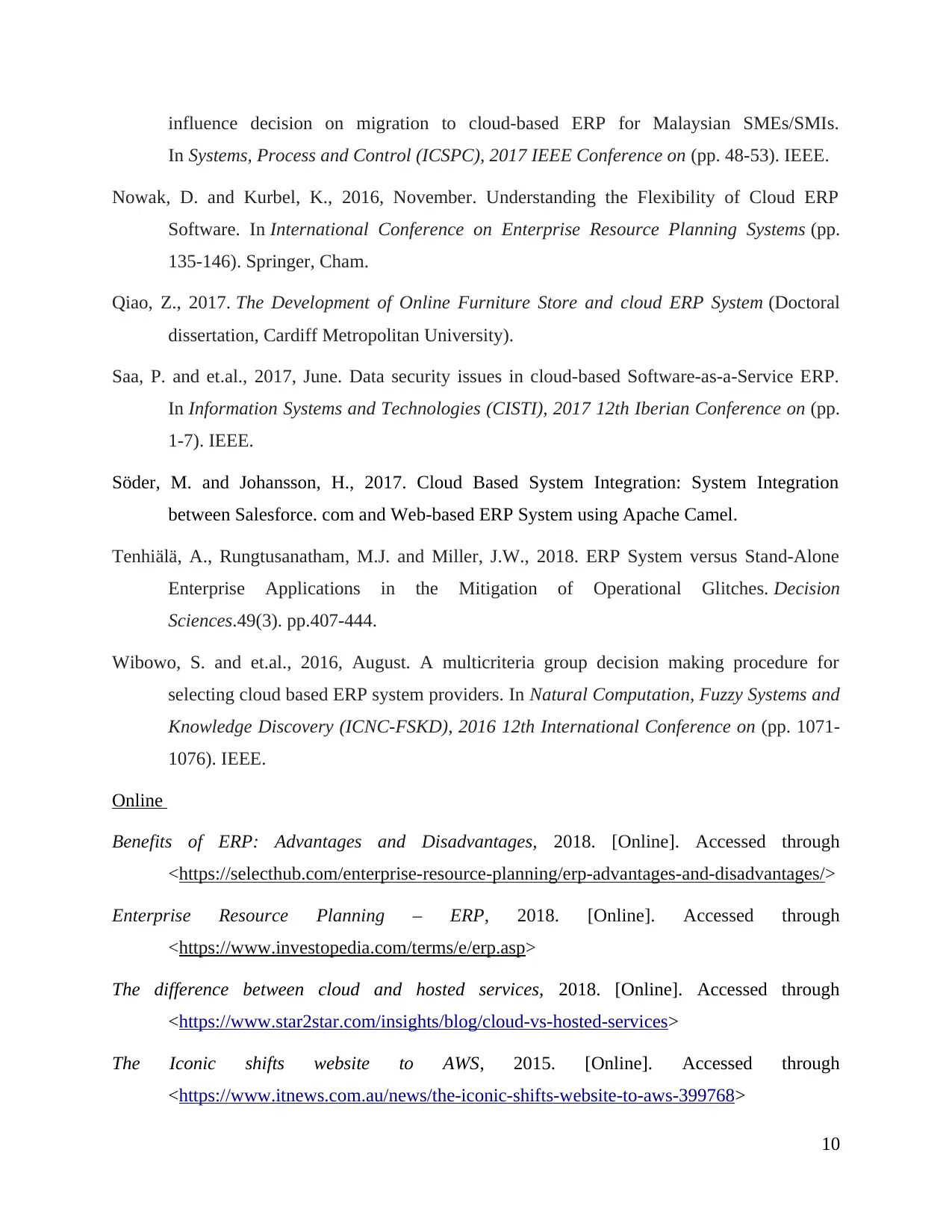
influence decision on migration to cloud-based ERP for Malaysian SMEs/SMIs.
In Systems, Process and Control (ICSPC), 2017 IEEE Conference on (pp. 48-53). IEEE.
Nowak, D. and Kurbel, K., 2016, November. Understanding the Flexibility of Cloud ERP
Software. In International Conference on Enterprise Resource Planning Systems (pp.
135-146). Springer, Cham.
Qiao, Z., 2017. The Development of Online Furniture Store and cloud ERP System (Doctoral
dissertation, Cardiff Metropolitan University).
Saa, P. and et.al., 2017, June. Data security issues in cloud-based Software-as-a-Service ERP.
In Information Systems and Technologies (CISTI), 2017 12th Iberian Conference on (pp.
1-7). IEEE.
Söder, M. and Johansson, H., 2017. Cloud Based System Integration: System Integration
between Salesforce. com and Web-based ERP System using Apache Camel.
Tenhiälä, A., Rungtusanatham, M.J. and Miller, J.W., 2018. ERP System versus Stand‐Alone
Enterprise Applications in the Mitigation of Operational Glitches. Decision
Sciences.49(3). pp.407-444.
Wibowo, S. and et.al., 2016, August. A multicriteria group decision making procedure for
selecting cloud based ERP system providers. In Natural Computation, Fuzzy Systems and
Knowledge Discovery (ICNC-FSKD), 2016 12th International Conference on (pp. 1071-
1076). IEEE.
Online
Benefits of ERP: Advantages and Disadvantages, 2018. [Online]. Accessed through
<https://selecthub.com/enterprise-resource-planning/erp-advantages-and-disadvantages/>
Enterprise Resource Planning – ERP, 2018. [Online]. Accessed through
<https://www.investopedia.com/terms/e/erp.asp>
The difference between cloud and hosted services, 2018. [Online]. Accessed through
<https://www.star2star.com/insights/blog/cloud-vs-hosted-services>
The Iconic shifts website to AWS, 2015. [Online]. Accessed through
<https://www.itnews.com.au/news/the-iconic-shifts-website-to-aws-399768>
10
In Systems, Process and Control (ICSPC), 2017 IEEE Conference on (pp. 48-53). IEEE.
Nowak, D. and Kurbel, K., 2016, November. Understanding the Flexibility of Cloud ERP
Software. In International Conference on Enterprise Resource Planning Systems (pp.
135-146). Springer, Cham.
Qiao, Z., 2017. The Development of Online Furniture Store and cloud ERP System (Doctoral
dissertation, Cardiff Metropolitan University).
Saa, P. and et.al., 2017, June. Data security issues in cloud-based Software-as-a-Service ERP.
In Information Systems and Technologies (CISTI), 2017 12th Iberian Conference on (pp.
1-7). IEEE.
Söder, M. and Johansson, H., 2017. Cloud Based System Integration: System Integration
between Salesforce. com and Web-based ERP System using Apache Camel.
Tenhiälä, A., Rungtusanatham, M.J. and Miller, J.W., 2018. ERP System versus Stand‐Alone
Enterprise Applications in the Mitigation of Operational Glitches. Decision
Sciences.49(3). pp.407-444.
Wibowo, S. and et.al., 2016, August. A multicriteria group decision making procedure for
selecting cloud based ERP system providers. In Natural Computation, Fuzzy Systems and
Knowledge Discovery (ICNC-FSKD), 2016 12th International Conference on (pp. 1071-
1076). IEEE.
Online
Benefits of ERP: Advantages and Disadvantages, 2018. [Online]. Accessed through
<https://selecthub.com/enterprise-resource-planning/erp-advantages-and-disadvantages/>
Enterprise Resource Planning – ERP, 2018. [Online]. Accessed through
<https://www.investopedia.com/terms/e/erp.asp>
The difference between cloud and hosted services, 2018. [Online]. Accessed through
<https://www.star2star.com/insights/blog/cloud-vs-hosted-services>
The Iconic shifts website to AWS, 2015. [Online]. Accessed through
<https://www.itnews.com.au/news/the-iconic-shifts-website-to-aws-399768>
10
⊘ This is a preview!⊘
Do you want full access?
Subscribe today to unlock all pages.

Trusted by 1+ million students worldwide
1 out of 13
Related Documents
Your All-in-One AI-Powered Toolkit for Academic Success.
+13062052269
info@desklib.com
Available 24*7 on WhatsApp / Email
![[object Object]](/_next/static/media/star-bottom.7253800d.svg)
Unlock your academic potential
Copyright © 2020–2026 A2Z Services. All Rights Reserved. Developed and managed by ZUCOL.




